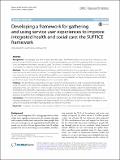Files in this item
Developing a framework for gathering and using service user experiences to improve integrated health and social care : the SUFFICE framework
Item metadata
| dc.contributor.author | Ward, Vicky | |
| dc.contributor.author | Pinkney, Lisa | |
| dc.contributor.author | Fry, Gary | |
| dc.date.accessioned | 2018-05-22T14:30:07Z | |
| dc.date.available | 2018-05-22T14:30:07Z | |
| dc.date.issued | 2016-09-08 | |
| dc.identifier | 253148003 | |
| dc.identifier | 329f8eda-046a-4ec1-89c2-cbf8e8e93a03 | |
| dc.identifier | 27609366 | |
| dc.identifier | 84986556255 | |
| dc.identifier.citation | Ward , V , Pinkney , L & Fry , G 2016 , ' Developing a framework for gathering and using service user experiences to improve integrated health and social care : the SUFFICE framework ' , BMC Research Notes , vol. 9 , 437 . https://doi.org/10.1186/s13104-016-2230-0 | en |
| dc.identifier.issn | 1756-0500 | |
| dc.identifier.other | PubMedCentral: PMC5017127 | |
| dc.identifier.other | ORCID: /0000-0001-8684-0403/work/64361453 | |
| dc.identifier.uri | https://hdl.handle.net/10023/13464 | |
| dc.description | This project was supported by the National Institute of Health Research (KRD/012/001/006) and by the Leeds South and East Clinical Commissioning group. | en |
| dc.description.abstract | BACKGROUND: More people than ever receive care and support from health and social care services. Initiatives to integrate the work of health and social care staff have increased rapidly across the UK but relatively little has been done to chart and improve their impact on service users. Our aim was to develop a framework for gathering and using service user feedback to improve integrated health and social care in one locality in the North of England. METHODS: We used published literature and interviews with health and social care managers to determine the expected service user experiences of local community-based integrated teams and the ways in which team members were expected to work together. We used the results to devise qualitative data collection and analysis tools for gathering and analyzing service user feedback. We used developmental evaluation and service improvement methodologies to devise a procedure for developing service improvement plans. FINDINGS: We identified six expected service user experiences of integrated care and 15 activities that health and social care teams were expected to undertake. We used these to develop logic models and tools for collecting and analysing service user experiences. These include a narrative interview schedule, a plan for analyzing data, and a method for synthesizing the results into a composite 'story'. We devised a structured service improvement procedure which involves teams of health and social care staff listening to a composite service user story, identifying how their actions as a team may have contributed to the story and developing a service improvement plan. CONCLUSIONS: This framework aims to put service user experiences at the heart of efforts to improve integration. It has been developed in collaboration with National Health Service (NHS) and Social Care managers. We expect it to be useful for evaluating and improving integrated care initiatives elsewhere. | |
| dc.format.extent | 11 | |
| dc.format.extent | 1484685 | |
| dc.language.iso | eng | |
| dc.relation.ispartof | BMC Research Notes | en |
| dc.rights | © 2016 The Author(s). This article is distributed under the terms of the Creative Commons Attribution 4.0 International License (http://creativecommons.org/licenses/by/4.0/), which permits unrestricted use, distribution, and reproduction in any medium, provided you give appropriate credit to the original author(s) and the source, provide a link to the Creative Commons license, and indicate if changes were made. The Creative Commons Public Domain Dedication waiver (http://creativecommons.org/publicdomain/zero/1.0/) applies to the data made available in this article, unless otherwise stated. | en |
| dc.subject | Integrated care | en |
| dc.subject | Service user experience | en |
| dc.subject | Health care | en |
| dc.subject | Social care | en |
| dc.subject | Service improvement | en |
| dc.subject | RA Public aspects of medicine | en |
| dc.subject | H Social Sciences | en |
| dc.subject | HD28 Management. Industrial Management | en |
| dc.subject | ZA Information resources | en |
| dc.subject.lcc | RA | en |
| dc.subject.lcc | H | en |
| dc.subject.lcc | HD28 | en |
| dc.subject.lcc | ZA | en |
| dc.title | Developing a framework for gathering and using service user experiences to improve integrated health and social care : the SUFFICE framework | en |
| dc.type | Journal article | en |
| dc.contributor.institution | University of St Andrews.School of Management | en |
| dc.identifier.doi | 10.1186/s13104-016-2230-0 | |
| dc.description.status | Peer reviewed | en |
This item appears in the following Collection(s)
Items in the St Andrews Research Repository are protected by copyright, with all rights reserved, unless otherwise indicated.

